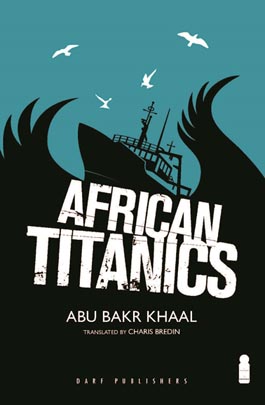Receive Our Newsletter
For news of readings, events and new titles.
You are invited to join the discussion about African Titanics, with the translator Charis Bredin, at the Banipal Book Club on 4th June
For details of time and place, please click here

AFRICAN TITANICS
Translated by Charis Bredin
Darf Publishers, UK. April 2014, ISBN:
9781850772736. Pbk, 122pp, £7.99.
The
turbulent swell of hell
Abu Bakr Khaal's African Titanics humanises and finds
poetry in a major tragedy of our day: the mass drownings of migrants fleeing
war and hardship on boats across the Mediterranean. Unscrupulous traffickers
take migrants from across Africa to the “liquid hell” of the sea where they
face a high risk of death trying to reach Europe aboard unseaworthy or
abandoned vessels nicknamed “African Titanics”. The novel’s author is an
Eritrean who lived in exile in Libya for many years. During the 2011 Libyan
revolution he spent months in a Tunisian refugee camp, and he now lives in
Denmark. Though his novel is slender it has an epic quality, ranging over vast
spaces and drawing on African history, magic, stories and songs.
The first-person
narrator, Abdar, is an Eritrean who succumbs to the “migration bug”. Abdar observes how “migration came flooding
through Africa, a turbulent swell sweeping everything along in its wake. None
of us knew when or how it would end. We simply watched, dumbfounded, as the
frenzy unfolded.” He goes first to Omdurman in Sudan and eventually tracks down
a people smuggler who agrees to drive him and more than twenty other migrants
across the desert to southern Libya. During the 15-day journey the migrants
suffer sandstorms, thirst and the threat of attacks by marauding tribesmen.
Several die on the journey. Abdar watches as a young Eritrean woman, Terhas,
tries futilely to keep a fellow migrant alive by hydrating him with her own
saliva.
The spare and lyrical style of the novel, deftly translated by Charis Bredin, adds to the starkness of the characters’ predicament. Khaal takes us deep into the precarious existence of the migrants as they wait to cross the sea while constantly trying to dodge the authorities in Libya and then Tunisia. The migrants exchange stories and banter in their cramped temporary refuges, and friendships are formed. Abdar draws close to Terhas and to the Liberian guitar-carrying hereditary storyteller Malouk “whose departure left a deep well of sadness within me that still torments me to this day”. He recalls Malouk’s stories and the legends that sprang up around him. This novel sheds new light on the plight of Africa’s “boat people”, and deserves to be widely read.
Published in Banipal 52 – New Fiction